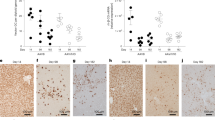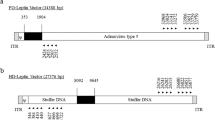Abstract
The use of replication-defective adenoviruses to deliver transgenes into hepatocytes seems to be a promising approach to human liver gene therapy. However, the effects that the adenovirus-mediated expression of a foreign gene could have on the expression of other hepatic characteristic genes have not yet been properly examined. We have investigated this problem by using human hepatocytes infected with a recombinant E-1 defective adenovirus that carried a modified lacZ gene. The analysis of the biochemical functionality of transduced cells showed that the use of adenovirus: (1) was a very efficient way to introduce a foreign gene into human hepatocytes (80% transduced cells after 1 h contact, at an MOI of 15; approximately 100% transduced cells at an MOI of 20); (2) allowed the expression of the transgene to levels that enabled cells effectively to use lactose as an energy source; (3) does not affect urea synthesis, plasma protein synthesis and xenobiotic biotransformation activities (1A2, 2A1, 2B6, 3A3/5). Glycolysis was moderately increased (approx- imately 20%), while gluconeogenesis decreased (approximately 20%) in transduced hepatocyte; moreover, (4) the expression of inducible genes (acute-phase plasma proteins, CYPs) was not impaired in transduced human hepatocytes upon stimulation with IL-6 or methylcholantrene. The results of this research support the idea that efficient expression of transgenes can be achieved in human hepatocytes by means of adenoviral transduction, without altering these characteristic hepatic biochemical functions.
This is a preview of subscription content, access via your institution
Access options
Subscribe to this journal
Receive 12 print issues and online access
$259.00 per year
only $21.58 per issue
Buy this article
- Purchase on Springer Link
- Instant access to full article PDF
Prices may be subject to local taxes which are calculated during checkout
Similar content being viewed by others
Author information
Authors and Affiliations
Rights and permissions
About this article
Cite this article
Castell, J., Hernández, D., Gómez-Foix, A. et al. Adenovirus-mediated gene transfer into human hepatocytes: analysis of the biochemical functionality of transduced cells. Gene Ther 4, 455–464 (1997). https://doi.org/10.1038/sj.gt.3300416
Received:
Accepted:
Issue Date:
DOI: https://doi.org/10.1038/sj.gt.3300416
Keywords
This article is cited by
-
HepG2 cells simultaneously expressing five P450 enzymes for the screening of hepatotoxicity: identification of bioactivable drugs and the potential mechanism of toxicity involved
Archives of Toxicology (2013)
-
Recent advances in 2D and 3D in vitro systems using primary hepatocytes, alternative hepatocyte sources and non-parenchymal liver cells and their use in investigating mechanisms of hepatotoxicity, cell signaling and ADME
Archives of Toxicology (2013)
-
Control of E1A under an E2F-1 promoter insulated with the myotonic dystrophy locus insulator reduces the toxicity of oncolytic adenovirus Ad-Δ24RGD
Cancer Gene Therapy (2006)
-
Coexpression of p21WAF1/CIP1 in adenovirus vector transfected human primary hepatocytes prevents apoptosis resulting in improved transgene expression
Gene Therapy (2003)
-
Macrophage inflammatory protein-2 gene therapy attenuates adenovirus- and acetaminophen-mediated hepatic injury
Gene Therapy (1999)



